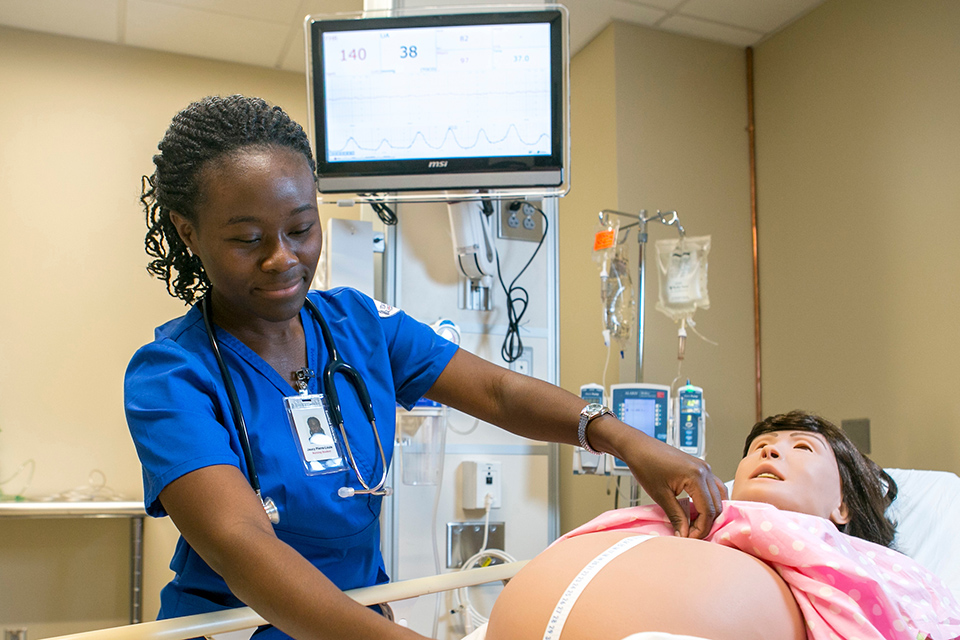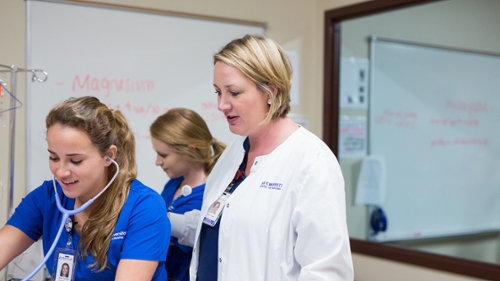The statistics surrounding maternal mortality rates in the United States are shocking. Approximately 700 women die each year of pregnancy-related complications. The Centers for Disease Control and Prevention (CDC) reports that deaths due to pregnancy are rising in the U.S., the only industrialized country where that is the case.
During her 15 years working in high-risk obstetrics, Megan Mileski, assistant professor in Ida Moffett School of Nursing, witnessed firsthand the life-threatening situations that can arise in pregnancy. The deaths of her own patients, including a young woman with a serious cardiac issue, sparked Mileski’s passion for maternal mortality and her work in finding solutions.
A Samford alumna and faculty member since 2012, Mileski teaches all OB-related courses for undergraduate students. She stresses the global impact of pregnancy and childbirth and how the health of a nation rises and falls on its mortality and morbidity. “Students have to think about how impactful this is on the health care of a whole nation,” she said.
In December 2018, Mileski began serving on Alabama’s Maternal Mortality Review Committee (MMRC). “The CDC has developed a process of review that’s very systematic and provides states with a way to get to the root cause of a mother’s death,” Mileski said.
In addition to Mileski and fellow nursing professor Kristen Johnston, Alabama’s MMRC committee includes social workers, physicians, anesthesiologists and law enforcement officers, among others.
“We are looking at every death of a woman who dies within a year of childbirth,” Mileski said. “We’re trying to determine if the mother’s death was related to being pregnant and if these deaths were preventable.”
Mileski’s dedication to finding solutions and teaching competent, compassionate care come from the same place. “As a student, I fell in love with caring for the vulnerable, laboring patient,” she said.
That love now influences her own students. Mileski has seen many students who didn’t want to pursue obstetrics change their minds after taking the required childbearing family course. “It’s a huge growth semester for a lot of students and an amazing opportunity to care for normal life processes,” she said. Her labor and delivery elective is her favorite course to teach, and it gives her the chance to really delve into legal and ethical issues, especially maternal mortality, with students.
“What we want for our patient is safe passage, to be fully restored and able to care for her baby,” she says. “I still cry with students, watching their first births.”
In Alabama, access to maternal care is shockingly lacking. While cardiovascular and surgical complications are among the biggest factors, some counties have no hospitals offering obstetrics or labor and delivery services. “This means pregnant women are sometimes traveling across three counties for care,” Mileski said. “A drastic change is needed in Alabama,” she continued. “No mother should die as a result of childbirth.”

Training compassionate and knowledgeable nurses, like Mileski, can help change the concerning trends in maternal mortality. Mileski is also co-chairing a committee at Samford with Lisa Baker, professor and chair of the School of Public Health’s Department of Social Work, to see how the university can contribute.

